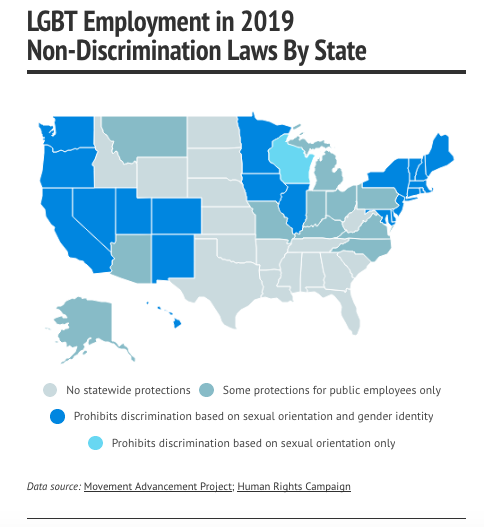Legal Discrimination
Can you be fired for being LGBT in your state?
How accurate was your prediction?
How surprised are you by this information?
List one question you would like answered about this information:
Beyond your own state. When you consider employment and discrimination across the United States, describe one pattern in discrimination do you see?
There are perhaps many causes for that pattern. Explain which is the most plausible explanation for that pattern.
Describe one negative consequence of this pattern.
Is this information good news or bad news?
Describe the demographic type of American who would most likely see this information as good news.
Imagine that we did NOT live in a federal system. Describe how this map would be different if the United States was, instead a unitary system.
Make a claim about the following question: Would it be better to have one consistent federal law about sexual orientation and employment?
Explain whether you believe it should be legal to fire employees for their sexual orientation?
In the comments section, explain whether firing someone based on their sexual orientation is any different than firing someone based on their race or gender?
In 1964 the U.S. Congress passed the landmark Civil Rights Act which outlawed discrimination based on race, religion, national origin and, notably, sex. Why didn’t Congress outlaw discrimination based on sexual orientation in 1964?
Why doesn’t the federal legislature outlaw LGBTQ discrimination today?
The Equal Employment Opportunity Commission, a federal agency that administers and enforces civil rights laws against workplace discrimination, has said the 1964 Civil Rights Act does guarantee protections against sexual orientation discrimination. Do federal agencies have discretion to make decisions about how to enforce laws?
The Trump administration has taken the opposite position from the EEOC, saying that the landmark legislation that outlawed discrimination based on race, religion, national origin and, notably, sex, cannot fairly be read to apply to discrimination based on sexual orientation or transgender status. What power does the Trump administration have over the EEOC and what can they do if they don’t like the EEOC’s enforcement decisions?
The Supreme Court is currently considering whether the Civil Rights Act of 1964 guarantees protections from workplace discrimination to gay and transgender people, agreeing to hear a case from New York, Altitude Express Inc. v. Zarda, No. 17-1623, along with one from Georgia that came to the opposite conclusion, Bostock v. Clayton County, Ga., No. 17-1618.. Based on what you know about the Supreme Court, why has the court taken on this issue?
How do you think the Supreme Court will rule?
Did you know that the New York case, Altitude Express Inc. v. Zarda, was brought by a skydiving instructor, Donald Zarda, who said he was fired because he was gay. His dismissal followed a complaint from a female customer who had voiced concerns about being tightly strapped to Mr. Zarda during a tandem dive. Mr. Zarda, hoping to reassure the customer, told her that he was “100 percent gay.” He was fired. Mr. Zarda sued under Title VII of the Civil Rights Act and lost the initial rounds. He died in a 2014 skydiving accident, and his estate pursued his case which they won in a recent appeals court ruling. If you were on the Court (you aren’t) explain how you would rule on this issue?
Explain whether you would make a distinction in your ruling between protection for LGB people and Trans people.
Do you think that the Court’s ruling on these cases will be landmark cases that will be studied by AP U.S. Government students in the future?
What are some groups that might file Amicus Curiae (friend of the court) Briefs in these current case before the Supreme Court?
Why do groups file Amicus Curiae briefs in cases, anyway?
How would a judicial conservative and a judicial activist differ in their approach to this case?
Would you like to live in a world without hypotheticals?
My wife owns and runs a bakery with over 60 employees. Yay cake!!! Explain whether you think my wife should be allowed to discriminate against employees based on the following characteristics:
race
sexual orientation
age
gender
religion
political belief
membership in Nazi Party
There are a number of types of discrimination you can investigate in Human Right’s Campaign’s interactive map above. Which of the following discrimination is the most widespread?
Employment
Conversion Therapy
Education
Gender Marker Updates On Identification Documents
Hate Crimes
Housing
Marriage Equality & Other Relationship Recognition
Public Accommodations
School Anti-Bullying
Transgender Healthcare




